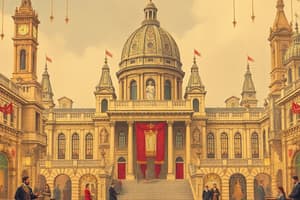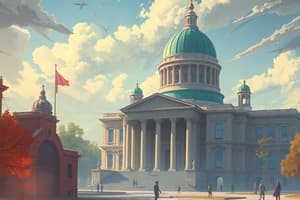Podcast
Questions and Answers
What was Aristotle's primary goal of politics?
What was Aristotle's primary goal of politics?
- To enforce strict laws
- To accumulate power for rulers
- To create a society for virtuous living (correct)
- To increase economic prosperity
How did Aristotle classify political structures?
How did Aristotle classify political structures?
- Good forms and bad forms (correct)
- Stable and unstable governments
- Monarchical and non-monarchical systems
- Federal and unitary systems
What is a key principle from Machiavelli's 'The Prince'?
What is a key principle from Machiavelli's 'The Prince'?
- The ruler must be feared more than loved (correct)
- Democracy is the best form of government
- Justice should prevail over power
- Loyalty is paramount
What did Machiavelli believe about the acquisition and retention of power?
What did Machiavelli believe about the acquisition and retention of power?
Which of the following claims about the state, according to Machiavelli, is correct?
Which of the following claims about the state, according to Machiavelli, is correct?
What is the primary focus of Political Science?
What is the primary focus of Political Science?
Who is recognized as the father of Political Science?
Who is recognized as the father of Political Science?
Which of the following concepts did Aristotle NOT extensively elaborate on?
Which of the following concepts did Aristotle NOT extensively elaborate on?
What aspect does the contemporary discipline of Political Science encompass?
What aspect does the contemporary discipline of Political Science encompass?
In what areas can a background in Political Science be beneficial?
In what areas can a background in Political Science be beneficial?
What methodological approach did Aristotle advocate in the study of Political Science?
What methodological approach did Aristotle advocate in the study of Political Science?
Which of the following is NOT a topic Aristotle discussed in his exploration of Political Science?
Which of the following is NOT a topic Aristotle discussed in his exploration of Political Science?
What is one of the practical realities of political life that Aristotle was concerned with?
What is one of the practical realities of political life that Aristotle was concerned with?
Flashcards are hidden until you start studying
Study Notes
What is Political Science?
- The study of politics and power from domestic, international, and comparative perspectives.
- Includes understanding political ideas, ideologies, institutions, policies, processes, and behavior
- Also encompasses groups, classes, government, diplomacy, law, strategy, and war.
- A background in political science is valuable for citizenship and political action, as well as for future careers in government, law, business, media, or public service.
The Contemporary Study of Political Science
- Broader than just government and politics
- Includes societal, cultural, and psychological factors that influence the operation of government
- Encompasses the body politic
Political Science Focus
- Focused on the theory and practice of government and politics at the local, state, national, and international levels
Father of Political Science
- Aristotle (384-322 BCE) is known as the father of political science.
- He was a Greek philosopher who wrote on a wide range of subjects, including natural science, poetry, ethics and geology.
- He is called the father of political science because of his work "Politics".
- Aristotle believed that political science was a powerful and dynamic branch of science.
Aristotle's Contributions to Political Science
- Elaborated on the topics and thinking of the Ideal State, slavery, revolution, education, citizenship, forms of government, the theory of golden mean, theory of constitution, etc.
- Empirical Observation: Emphasized empirical observation and systematic study of political systems from various city or states to understand their functions and effects.
- Practical Focus: Concerned with the practical realities of political life like how the government operates and the role of citizens.
- Virtue and the Common Good: Believed the goal of politics was to create a society where citizens could live virtuous lives.
- Classification of Government: Classified political structures into six: good forms (monarchy, aristocracy, polity) and corrupt forms (tyranny, oligarchy, democracy).
- Ethics and Politics: Integrated ethics with politics, arguing the purpose of the state is to promote the good life for its citizens.
- Influenced on Later Thought: His ideas had profound and lasting influence on western political thought and are still considered foundational in political science today.
- Father of Modern Politics: Niccolo Machiavelli
Father of Modern Politics
- Niccolo Machiavelli (May 3, 1469 – June 21, 1527) was an Italian Renaissance historian, politician, diplomat, philosopher, Humanist, and writer.
- He has often been called the founder and the father of modern political science.
- Influenced both Catholic and Protestant kings with his book "The Prince" which contains maxims concerning politics.
Machiavelli's Key Principles in "The Prince"
- Realpolitik
- The Ends Justify the Means
- Flexibility and Adaptability
- Control of Public Perception
- Fear vs Love
- Machiavelli states that the state is superior to all associations in human society.
- He argues that the more difficult it is to acquire control over a state, the easier it is to hold on to it.
Studying That Suits You
Use AI to generate personalized quizzes and flashcards to suit your learning preferences.




